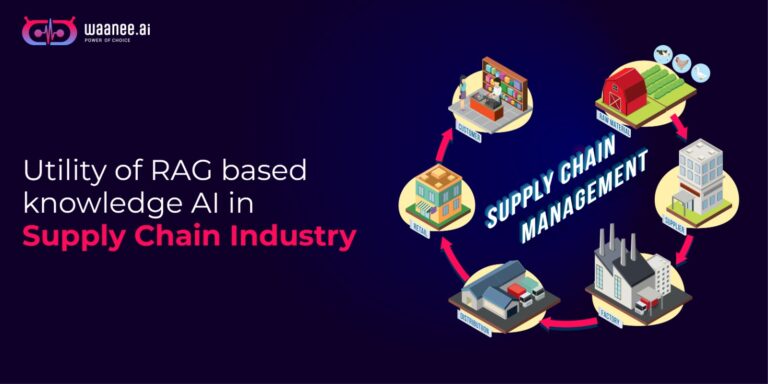
-
Waanee AI Labs
View All »

Get The Latest
Detecting Fraud Patterns Through Voice Conversations in Real Time
Read More »Will AI Replace Call Center Agents? The Truth About Virtual Assistants and Human Collaboration
Read More »Transforming Contact Centers with Waanee AI's Agentic Framework
Read More » - Blog
Utility of RAG based knowledge AI in supply chain Industry
Posted by Vishal Vanwari, on 12 Aug, 2024 09:31 AM

In today’s complex and interconnected global economy, supply chain management has become increasingly challenging. Companies are constantly seeking innovative solutions to streamline operations, enhance efficiency, and maintain a competitive edge. One such groundbreaking technology making waves in the industry is Retrieval-Augmented Generation (RAG) based knowledge AI. This powerful tool is revolutionizing how supply chain professionals access, process, and utilize information to make informed decisions.
Understanding RAG-based Knowledge AI
RAG-based knowledge AI combines the power of large language models with external knowledge bases to provide more accurate, contextual, and up-to-date information. This approach allows AI systems to access and leverage vast amounts of data, including company-specific information, industry reports, and real-time market data, to generate highly relevant and insightful responses.
Enhancing Decision-Making in Supply Chain Management
One of the primary benefits of RAG-based knowledge AI in supply chain management is its ability to support decision-making processes. By quickly retrieving and synthesizing information from various sources, these systems can provide supply chain professionals with comprehensive insights on:
- Supplier performance and risk assessment
- Inventory optimization strategies
- Transportation and logistics planning
- Demand patterns and trends
- Regulatory compliance and global trade requirements
This wealth of information enables managers to make more informed decisions, potentially leading to improved operational efficiency and cost savings.
Streamlining Information Access and Knowledge Management
In many organizations, valuable supply chain knowledge is scattered across different departments, systems, and documents. RAG-based knowledge AI acts as a centralized hub, consolidating information from various sources and making it easily accessible to all stakeholders. This capability is particularly useful for:
- Onboarding new employees and knowledge transfer
- Sharing best practices across different teams and locations
- Quickly accessing historical data and previous case studies
- Maintaining an up-to-date knowledge base of supplier information, contracts, and performance metrics
By improving information flow and knowledge sharing, RAG-based AI helps create a more agile and responsive supply chain organization.
Enhancing Customer Service and Supplier Relations
RAG-based knowledge AI can significantly improve communication and service levels in supply chain operations. For instance:
- Customer service representatives can quickly access accurate information about order status, product availability, and shipping details, leading to faster query resolution and improved customer satisfaction.
- Procurement teams can leverage AI-powered insights to negotiate better terms with suppliers, manage contracts more effectively, and identify potential areas for collaboration and innovation.
- Suppliers can benefit from clearer communication and more consistent information from their customers, potentially leading to stronger, more productive relationships.
Optimizing Inventory Management
Effective inventory management is crucial for supply chain success. RAG-based knowledge AI can contribute to this area by:
- Multimodal Gnerative AI can Provide insights on historical inventory trends and patterns
- Offering recommendations for safety stock levels based on various factors such as lead times, demand variability, and supplier reliability
- Identifying slow-moving or obsolete inventory items
- Suggesting optimal reorder points and quantities based on the historical data
By leveraging these AI-powered insights, companies can potentially reduce carrying costs, minimize stockouts, and improve overall inventory turnover.
Enhancing Risk Management and Resilience
Supply chain risk management has become increasingly important in recent years. RAG-based knowledge AI can play a crucial role in identifying and mitigating potential risks by:
- Analyzing news feeds, social media, and other external data sources to identify potential disruptions or emerging risks
- Providing insights on alternative suppliers or transportation routes in case of disruptions
- Offering recommendations for risk mitigation strategies based on historical data and industry best practices
- Assisting in the development and updating of contingency plans
By leveraging AI to enhance risk management capabilities, companies can build more resilient and adaptive supply chains.
Improving Sustainability and Ethical Sourcing
As sustainability becomes a growing concern for businesses and consumers alike, RAG-based knowledge AI can support supply chain professionals in making more environmentally friendly and ethical decisions. The technology can:
- Provide information on suppliers’ sustainability practices and certifications
- Offer insights on the environmental impact of different sourcing and transportation options
- Assist in tracking and reporting on sustainability metrics and compliance with environmental regulations
- Suggest alternatives for more sustainable materials or processes
By leveraging AI to support sustainability initiatives, companies can align their supply chain operations with broader corporate social responsibility goals.
Challenges and Considerations
While the potential benefits of RAG-based knowledge AI in supply chain management are significant, it’s important to acknowledge some challenges and considerations:
- Data quality and integration: The effectiveness of RAG-based AI systems relies heavily on the quality and comprehensiveness of the underlying data. Companies must invest in data cleansing, integration, and governance to ensure optimal results.
- User adoption and training: Implementing AI systems requires change management and user training to ensure that supply chain professionals can effectively leverage the technology in their daily work.
- Ethical considerations: As with any AI system, it’s crucial to address ethical concerns such as data privacy, algorithmic bias, and transparency in decision-making processes.
- Continuous improvement: RAG-based knowledge AI systems require ongoing maintenance, updates, and refinement to ensure they remain accurate and relevant in the face of changing business conditions and requirements.
Conclusion
RAG-based knowledge AI represents a powerful tool for transforming supply chain management. By enhancing decision-making, streamlining information access, improving customer service, optimizing inventory management, and supporting risk management and sustainability initiatives, this technology has the potential to drive significant improvements in supply chain performance and competitiveness.
As the technology continues to evolve and mature, forward-thinking supply chain organizations have the opportunity to leverage RAG-based knowledge AI to build more efficient, resilient, and sustainable operations. By embracing this innovative approach to information management and decision support, companies can position themselves at the forefront of supply chain excellence in an increasingly complex and dynamic global marketplace.
READ ALSO...
Detecting Fraud Patterns Through Voice Conversations in Real Time
03 Jul, 2025 11:09 AM
Will AI Replace Call Center Agents? The Truth About Virtual Assistants and Human Collaboration
19 May, 2025 11:30 AM
Transforming Contact Centers with Waanee AI's Agentic Framework
25 Feb, 2025 01:52 PM
Revolutionize CX
with AI power
Delivers personalized interactions and immediate, data-driven solutions powered by AI, transforming customer experiences.

We use cookies!
We use cookies to ensure that we give you the best experience on our website.
By continuing to use this site, you accept our use of cookies. Learn more
 Recruit Industries Agents
Recruit Industries Agents Build Your Agent
Build Your Agent Improve Self Service
Improve Self Service Employee Experience
Employee Experience Sales and Cross Sales
Sales and Cross Sales Calling Script
Calling Script Integration & APIs
Integration & APIs Auto Summarization
Auto Summarization Conversational Intelligence
Conversational Intelligence Sentiment Analytics
Sentiment Analytics Auto QA
Auto QA Net Promoter Score
Net Promoter Score